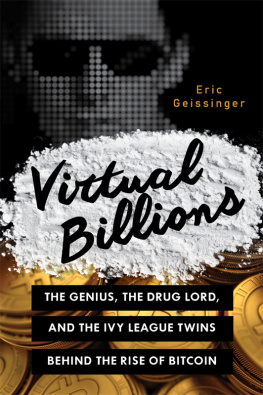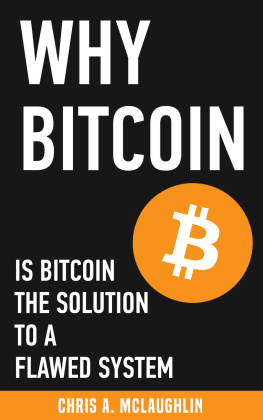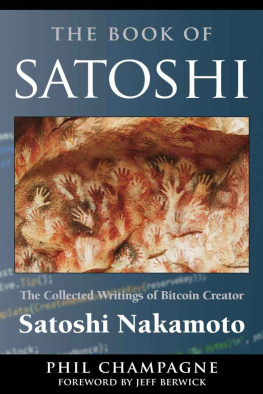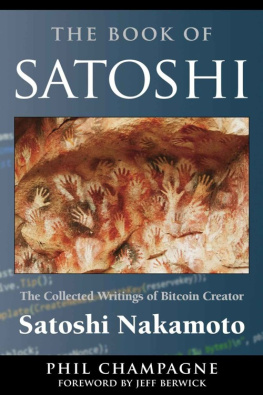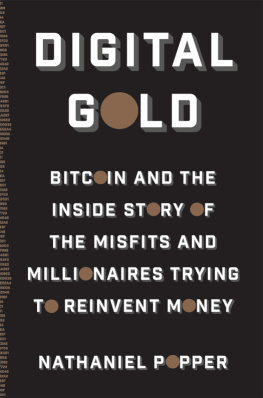
This book would not be possible without the copious love, support, and guidance of Jennifer Wilder, who sacrificed without demur throughout a tumultuous year, as all things Bitcoin were inflicted upon our family. Her editorial skill, stylistic sophistication, narrative acumen, and general literary savvy form the bedrock of the book. She is utterly invaluable: I consider myself blessed that our lives are, in all ways, entwined. I would also like to thank my wonderful agent, Sheree Bykofsky; all those who took the time to explain to me, patiently and in plain English, how Bitcoin does and does not function (Ittay Eyal, Emin Gun Sirer, Alex Waters, Sarah Tyre, and many more); Amy Reading and Jay Farmer, for literary, emotional, and liquid support; the Constance Saltonstall Foundation, who kick-started the project with a writing retreat; to my parents for a blissful and trauma-free childhood; Nancy and Tim Wilder for stepping up to the plate in various ways and hitting what were minimally triples and typically homeruns; Janet Rosen and Marcie Terman, who got me in touch with the incomparable Gavin Smith; Poornima Apte for advice and guidance; the Prometheus team (Steven and Peter and Jake and all the rest); and my long-suffering editor, Sheila Stewart, immensely competent at sifting silver from dross. Last, but certainly not least, I'd like to thank my two daughters, Effie and Poppy, whose energy, enthusiasm, and patience helped me power through late nights and the occasional impenetrable Bitcoin minutiae.

WHO IS SATOSHI?
Bitcoin's inventor is an enigma named Satoshi Nakamoto. Satoshi might be a reclusive genius quietly living in rustic privacy, or a group of like-minded enthusiasts who cooperatively created Bitcoin, making it the King James Bible of cryptocurrency. Nobody really knows, and speculation about his (or her or their) secret identity hasn't been fruitful, but it's been fun for the mass media to propose and investigate various alternatives. Here are a few possibilities that have been thrown out (and shot down) in recent years:
New Yorker, 2011. Suspects: Dr. Vili Lehdonvirta and/or cryptologist Michael Clear.
Evidence: Based on mutual association and Michael Clear's experience with cryptology, peer-to-peer networks, and interest in virtual currencies.
Fast Company, 2011. Suspects: Neal King, Vladimir Oksman, and Charles Bry.
Evidence: Based on patent filings and a curious chronology related to registering the bitcoin.org domain name.
Forbes, 2013. Suspect: Shinichi Mochizuki, a Japanese mathematician.
Evidence: Based on his unusual publishing habits and evident brilliance. Plus he's Japanese.
Vice, 2013. Suspects: Gavin Andresen or Jed McCaleb.
Evidence: Both highly experienced programmers with vast experience in peer-to-peer networks. Gavin Andresen was Bitcoin project's lead developer for a long period of time; Jed McCaleb produced the Mt. Gox exchange and faded away from it just as Satoshi faded away from Bitcoin.
Newsweek, 2014. Suspect: Dorian Nakamoto.
Evidence: Widely publicized and discredited story about Dorian, an out-of-work engineer in Temple City, California. Dorian Nakamoto, who denies being Satoshi, is currently pondering litigation against Newsweek using a crowdsourced legal fund.
Digital Gold, 2015, by Nathaniel Popper. Suspect: Nick Szabo.
Evidence: Szabo is an experienced programmer with close ties to a pre-Bitcoin digital currency called Bit gold, and has significant ongoing involvement with Bitcoin development and startups.
Wired, 2015. Suspect: Craig Steven Wright.
Evidence: Wright's 2008 blog included posts about Bitcoin that seem to predate Bitcoin's release. Wired also gained access to leaked documents from business ventures and financial records that point toward Wright being, at the least, Bitcoin's cocreator; however (as Wired admits) all these documents could have been forged.
None of these hypothesized Satoshis have (so far) withstood close scrutiny, and having run through all the obvious possibilities it's now clear Satoshi's real identity won't be known unless Satoshi directly reveals himself. As time passes this is increasingly unlikely.
Satoshi hasn't completely hidden his tracksplenty of conclusions can be drawn from the evidence he's left behind, and fortunately (for the sake of a good story) Satoshi is probably not a group of people. Language experts,correspondents, which would have been difficult or impossible to pull off if a committee was involved in reading and responding to every message. Satoshi writes in a natural style of English; despite his apparently Japanese name there are almost no grammatical errors in his writing and no mistakes of types often produced when native Japanese speakers learn and write English.
A survey of Satoshi's message board time stamps All this is speculation, of course, but based on hard evidence. More significantly, the majority of Satoshi's writings were produced when Bitcoin was far from a sure thing. In 2009, Bitcoin wasn't thought to have more than a chance in a million of surviving its first year, much less prospering. If Satoshi had purposefully altered his message board time stamps, and assiduously camouflaged his writing, he would have had to have done so from the very startshowing unbelievable prescience and patience.
Satoshi wasn't just Bitcoin's inventor; he was an early and active bitcoin miner and left traces in the public transaction ledger of the powerful machine (or suite of machines) he used to solve Bitcoin's hashing problems. Statistical analysis), which briefly made him without doubt the most unlikely and anonymous billionaire the world has ever seen.
The Ockham's razor principle suggests giving primacy to explanations unburdened by a host of assumptions and hypotheticals. If a shed burns down, it's possible the fire was caused by a cops-vs-robbers shootout, a thwarted alien invasion, oran electrical short. Yes, it's humdrum, and it's boring, but it doesn't require many assumptions. The shed had electricity, its wires were old, and something easily could have gone wrong. In this spirit, the extent of Satoshi's misdirection likely began and ended with his name. Satoshi wasn't part of a group so disciplined during Bitcoin's creation and subsequent development that nobody peeped a word about the wonderful prank they pulled on the world. He wasn't a government plant. There isn't a code-related reason the original Bitcoin client required more than one person; in the past, far more complicated programs have been written by a single programmer.
I'm not convinced it really matters if we ever discover the real Satoshi, somebody we can shake hands with and talk to over coffee and award innovation prizes. What matters most, and the reason anyone's spent a second thinking about Satoshi, is Bitcoin. That Satoshi's creation proved reliable and resilient and found an eager and interested global audience is a testament to his creativity and his programming prowess.
Satoshi walked away from Bitcoin support and development on December 11, 2010, at 11:39:16 p.m. His final message board post was in response to a proposal that WikiLeaks accept Bitcoin, since all other avenues of financial support to the site had been cut off by various irate governments. It wasn't clear that the Bitcoin network was mature enough, or stable enough, to handle a sudden influx of attention.
Satoshi was worried the United States government might attempt to shut down Bitcoin or conduct a massive search to identify and capture its creator. Satoshi, spooked by sudden celebrity, nervous about the government's far-reaching powers, and unsure about the future, faded awayhis record is afterward blank. An army of volunteers took over Bitcoin development, and Satoshi hasn't been heard from again.
Next page
